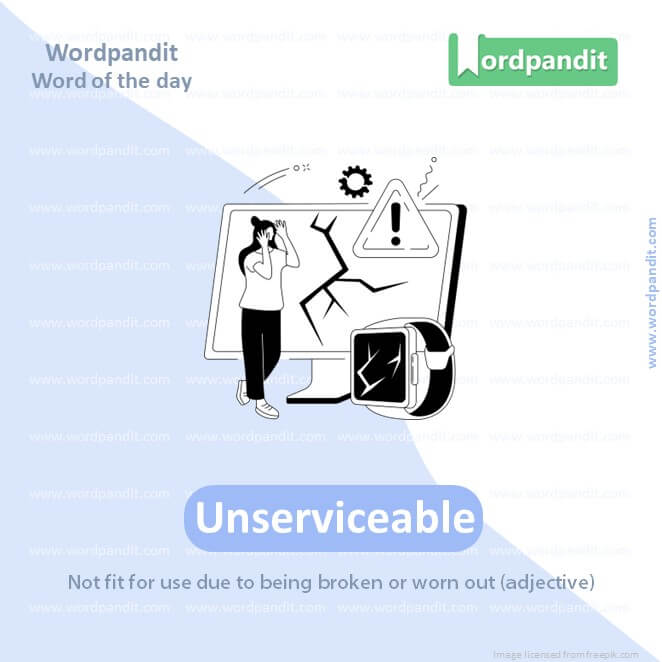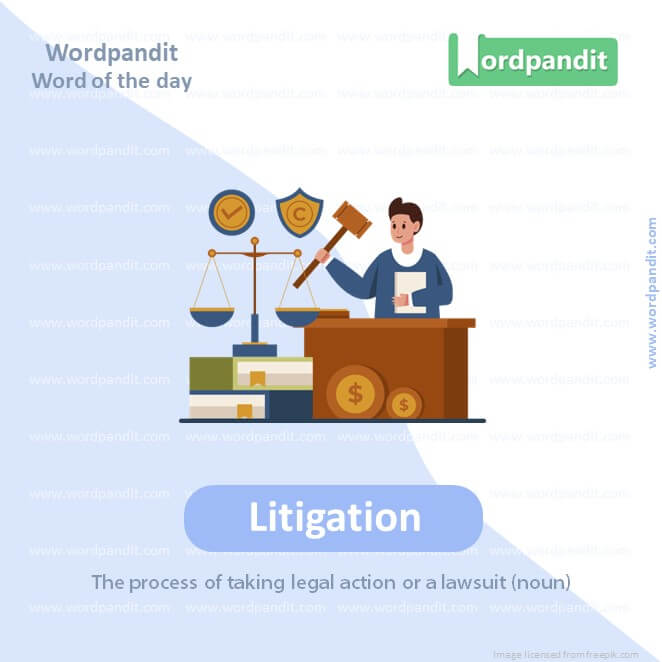Daily Vocabulary Words: List of Daily Used Words
Hi there. Welcome to this special section @ Wordpandit.
Our endeavour here is straightforward: highlighting important daily vocabulary words, you would encounter in The Hindu. This is your repository of commonly used words; essentially, we are posting a list of daily used words. Hence, this has significant practical application as it teaches you words that are commonly used in a leading publication such as The Hindu.
Visit the website daily to learn words from The Hindu.

WORD-1: Unserviceable
CONTEXT: The ATC calls on the wet runway condition were more in line with Boeing terminology. The aircraft also had one thrust reverser unserviceable.
SOURCE: The Hindu
EXPLANATORY PARAGRAPH: Imagine you have a toy that you love playing with, but one day it breaks and you can’t play with it anymore. When something is like that toy, too broken or old to be used, we say it is ‘unserviceable’. It’s like saying it’s not useful for its job anymore.
MEANING: Not fit for use due to being broken or worn out (adjective).
PRONUNCIATION: un-SUR-viss-uh-bull
SYNONYMS: Useless, Inoperative, Nonfunctional, Broken, Defective, Inefficient.
USAGE EXAMPLES:
1. The old printer in the office became unserviceable.
2. After the storm, many power lines were unserviceable.
3. The mechanic declared the old car unserviceable.
4. Their unserviceable equipment was replaced with new models.

WORD-2: Facilitating
CONTEXT: It has also been able to drive institutional reform by facilitating strategies for creating more accessible voting machines and websites.
SOURCE: The Hindu
EXPLANATORY PARAGRAPH: Think of when someone helps you do something, like tying your shoes or solving a puzzle. ‘Facilitating’ is a fancy word for helping make something easier or possible.
MEANING: Making a process or action easy or easier (verb).
PRONUNCIATION: fuh-SIL-i-tay-ting
SYNONYMS: Assisting, Enabling, Simplifying, Supporting, Easing, Accelerating.
USAGE EXAMPLES:
1. The teacher is facilitating the students’ learning.
2. Online banking is facilitating faster transactions.
3. The new software is facilitating better communication.
4. Workshops are facilitating skill development among employees.

WORD-3: Litigation
CONTEXT: Defaulting service providers want to avoid the high costs and negative publicity associated with litigation, while complainants want a barrier-free participation in the marketplace, both of which can be achieved through structured negotiation.
SOURCE: The Hindu
EXPLANATORY PARAGRAPH: Imagine people disagree on something important and decide to go to a place where a judge helps solve their problem. This is called ‘litigation’. It’s like having a big, serious argument, but in a courtroom.
MEANING: The process of taking legal action or a lawsuit (noun).
PRONUNCIATION: lit-ih-GAY-shun
SYNONYMS: Lawsuit, Legal proceedings, Legal action, Trial, Dispute.
USAGE EXAMPLES:
1. The company was involved in litigation over patents.
2. Litigation can be expensive and time-consuming.
3. The celebrity is facing litigation for breach of contract.
4. They settled their disputes without going into litigation.

WORD-4: Dissuading
CONTEXT: the increasing pendency, paperwork and red tape in Indian civil courts are already dissuading parties from using traditional dispute resolution methods.
SOURCE: The Hindu
EXPLANATORY PARAGRAPH: When your friend wants to do something that’s not a good idea, like touching a hot stove, and you talk them out of it, you’re ‘dissuading’ them. It means you’re trying to convince someone not to do something.
MEANING: Persuading someone not to take a particular course of action (verb).
PRONUNCIATION: di-SWAYD-ing
SYNONYMS: Discouraging, Deterring, Preventing, Talking out of, Steering clear.
USAGE EXAMPLES:
1. Her parents tried dissuading her from dropping out of school.
2. The risks involved were dissuading him from investing.
3. Despite the warnings, they were not dissuaded from their plan.
4. His friends are dissuading him from making a hasty decision.
WORD-5: Pertinent
CONTEXT: it is pertinent to note here that the success of any alternative dispute resolution model is directly proportional to the level of priority that such service providers are willing to afford to the struggles of persons with disabilities.
SOURCE: The Hindu
EXPLANATORY PARAGRAPH: If you’re talking about cats and someone mentions dogs, that’s not really related. But if they talk about different kinds of cats, that’s ‘pertinent’. It means something is important or connected to the thing you’re talking about.
MEANING: Relevant or applicable to a particular matter (adjective).
PRONUNCIATION: PUR-tih-nent
SYNONYMS: Relevant, Applicable, Appropriate, Related, Connected.
USAGE EXAMPLES:
1. She asked several pertinent questions during the meeting.
2. The lawyer presented all pertinent evidence in the case.
3. It’s important to stay pertinent to the topic.
4. The book provides pertinent information on the subject.

WORD-6: Amicably
CONTEXT: the time such providers continue to feel that there are no real benefits of providing any services to persons with disabilities, any attempts to settle these claims amicably outside courts would be a tall order to achieve.
SOURCE: The Hindu
EXPLANATORY PARAGRAPH: When you share your toys nicely with others and don’t fight, you’re being ‘amicably’ friendly. It’s when people do things in a friendly way without arguing or being upset.
MEANING: In a friendly and peaceable manner (adverb).
PRONUNCIATION: AM-ih-kah-blee
SYNONYMS: Friendly, Peaceably, Cordially, Harmoniously, Cooperatively.
USAGE EXAMPLES:
1. The dispute was settled amicably.
2. They agreed amicably on the terms of the contract.
3. The team worked amicably on the project.
4. They parted amicably after the discussion.
WORD-7: Divinity
CONTEXT: it made sense to keep Bethlehem as simple and dignified as possible to preserve its divinity and reflect the way Jesus came into this world — quietly and almost unnoticed.
SOURCE: The Hindu
EXPLANATORY PARAGRAPH: Think about a powerful being that people might pray to, like God. This is called ‘divinity’. It’s a way to talk about gods or anything related to them.
MEANING: The state of being a god or god-like, or a study of religion (noun).
PRONUNCIATION: dih-VIN-ih-tee
SYNONYMS: Godliness, Holiness, Spirituality, Theology, Sacredness.
USAGE EXAMPLES:
1. Many cultures have different beliefs about divinity.
2. She is studying divinity at the university.
3. The temple was a place of divinity and worship.
4. They discussed the concept of divinity in their class.
WORD-8: Dissservice
CONTEXT: the disservice Hamas has done is project the conflict as one between Muslims and Jews rather than between Palestinians and Israelis.
SOURCE: The Hindu
EXPLANATORY PARAGRAPH: Imagine you try to help someone but end up making things worse. That’s doing a ‘disservice’. It means you’re trying to help, but you’re actually causing harm or problems.
MEANING: An action that harms someone or something (noun).
PRONUNCIATION: dis-SUR-vis
SYNONYMS: Harm, Damage, Injustice, Disfavor, Wrong.
USAGE EXAMPLES:
1. Spreading false information does a disservice to everyone.
2. Ignoring the problem would be a disservice to the community.
3. His comments were a disservice to the team’s morale.
4. They did a disservice by not listening to the feedback.
WORD-9: Denouncing
CONTEXT: Some community leaders launched a signature campaign denouncing the participants for failing to highlight the “grave injustice” meted out to the community in Manipur and at large.
SOURCE: The Hindu
EXPLANATORY PARAGRAPH: When someone does something very bad and you tell others loudly that it’s wrong, that’s ‘denouncing’. It’s like saying, “That’s not right!” in a strong way to let everyone know.
MEANING: Publicly declaring something to be wrong or evil (verb).
PRONUNCIATION: di-NOWN-sing
SYNONYMS: Condemning, Criticizing, Attacking, Censuring, Repudiating.
USAGE EXAMPLES:
1. The mayor is denouncing the acts of vandalism in the city.
2. They were denouncing the new policy as unfair.
3. The article denounced corruption in politics.
4. Activists are denouncing the decision to cut down the forest.
WORD-10: Acquisition
CONTEXT: Tamil Nadu has encountered challenges in land acquisition for infrastructural projects.
SOURCE: The Hindu
EXPLANATORY PARAGRAPH: Think about when you get something new, like a toy or a book. This getting of something is called ‘acquisition’. It means you have gained or gotten something.
MEANING: The act of gaining possession of something (noun).
PRONUNCIATION: ak-wuh-ZISH-un
SYNONYMS: Purchase, Obtainment, Procurement, Attainment, Gain.
USAGE EXAMPLES:
1. The museum’s new acquisition was an ancient sculpture.
2. The company announced the acquisition of a smaller firm.
3. Her latest acquisition was a rare painting.
4. The acquisition of knowledge is essential for success.
Vocabulary Definition
Understanding a language requires a deep grasp of the ‘vocabulary definition’. These precise meanings of words shape our understanding and communication. However, to successfully learn ‘vocabulary definition’, one must do more than just memorize a dictionary. So what’s the perfect approach to assimilating ‘vocabulary definition’?
The compelling answer is context. To truly comprehend ‘vocabulary definition’, expose yourself to diverse reading materials such as books, magazines, newspapers, and digital content. This approach equips you with a practical understanding of ‘vocabulary definition’ and illuminates the nuanced ways in which they get employed in conversation and writing.
An innovative way to enhance memory while learning ‘vocabulary definition’ involves visualization. By creating a mental image representing the definition, your brain can help cement the association between the word and its meaning, improving recall capability significantly.
Now, understanding and retaining ‘vocabulary definition’ is only one part of the equation. The other, equally essential part is application. Actively using these words in your personal conversations, professional communication, or social media posts will reinforce your understanding and usage of ‘vocabulary definition’.
Interactive language tools can be a great help when mastering ‘vocabulary definition’. Language-learning software and applications often provide comprehensive word definitions, examples, and even quizzes to test your learning progress.
In conclusion, the journey of embracing ‘vocabulary definition’ demands a blended approach. Diversified reading materials, visualization techniques, active application, and the leverage of modern language-learning tools together chart a pathway to mastering ‘vocabulary definition’. Remember, every word definition you conquer is a stepping stone leading you to the magnificent mansion of language proficiency. Happy learning!











